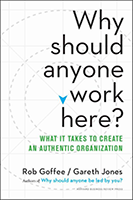What we say...
-
3 Critical Skills to Teach in Leadership Training
Sunday 1st September 2019
-
Leadership, Change and Uncertainty
Friday 6th April 2018
-
What does the Oxfam scandal tell us about organisations
Friday 23rd February 2018
-
I look forward to speaking at The HR Congress
Tuesday 31st October 2017
-
Why should anyone work here - Animation
Friday 11th December 2015
Agile Problem-Solving at the London Olympics
In this lull between the Olympics and Paralympics, London is enjoying wide acclaim for the success of the 2012 Games, and rightly so. But not everything has gone according to plan. And from the standpoint of those of us who study organizations, even that can be considered a good thing. It is in the moments when an organization has to deal with the unexpected that we learn about its true mettle.
As has been widely chronicled, less than a month before the opening ceremony, it became clear that G4S, the private security firm to whom much of the security arrangements had been contracted, was unable to meet its obligations. Given that London was regarded as vulnerable to terrorist attacks, disaster beckoned. So what was to be done? After hurried consultation with governments, the armed forces were swiftly mobilized. Remember, many of these servicemen and women had just returned from arduous and dangerous assignments in Afghanistan. Hardly good preparation for providing security at one of the world's greatest celebrations.
And yet from the jaws of disaster a considerable victory was snatched. Security has been a success. Visitors to the London Olympics have praised the professionalism of the Armed Forces, their humor and humanity.
On our first visit to the Olympic Park we were searched by the Paratroopers in their signature maroon berets. It was conducted thoroughly, but most importantly we were impressed by their almost instant authority. No one questioned their right to search our bags. On another occasion a crowd left the boxing arena in a hurry to get to the rail station. There was a real danger of the platform becoming overcrowded. Seemingly out of nowhere, two Paras arrived and politely asked the crowd to wait while the platform cleared. We all stopped immediately and waited patiently. Inside the Park, other regiments played a rather different role. The RAF regiment in their distinctive light blue uniforms casually walked around helping with directions, asking whether people were enjoying themselves—rather like hosts at a holiday park!
What did it take for these military units to step in and deal with the demands of the Olympics so well? We think the experience has some lessons to teach other organizations about the keys to high performance. The first lesson is that a great organization is able to act swiftly and adapt fast. By the way, armies, especially well trained ones, are particularly good at this. The way the security threat was handled shows great agility. Second, it really helps to instil a sense of professionalism throughout the ranks. Professionalism gives your organization almost instant legitimacy both with customers and employees.
Finally, the experience of security at the London Olympics demonstrates how creative problem-solving has come to the fore as an organizational strength. To meet this test, organizations have to cultivate and tap into cultural variation. Even within organizations as seemingly regimented as the Armed Forces there are considerably different backgrounds and perspectives that can combine to supply creative solutions to complex problems. Creativity increases with diversity and declines with sameness.
In some people's minds, these three strengths may seem hard to reconcile, and it's true that there is inherent tension among them. If there was one defining characteristic of the London Olympics, however, it was the flair that comes from combining professionalism with creativity. From the mini BMWs which collected the discuses, to the quirky pageantry of the opening and closing ceremonies, it charmed the world and managed to define Britishness more clearly than any recent event.
We live in a volatile, ambiguous world in which organizations must constantly sense and act on change. Recent economic history is full of stories of organizations that have kept on pursuing old strategies after their time had passed. The clever organizations are the ones that turn threats into opportunities, relying on professionalism and creativity to respond with agility.
Credit: Harvard Business Review



